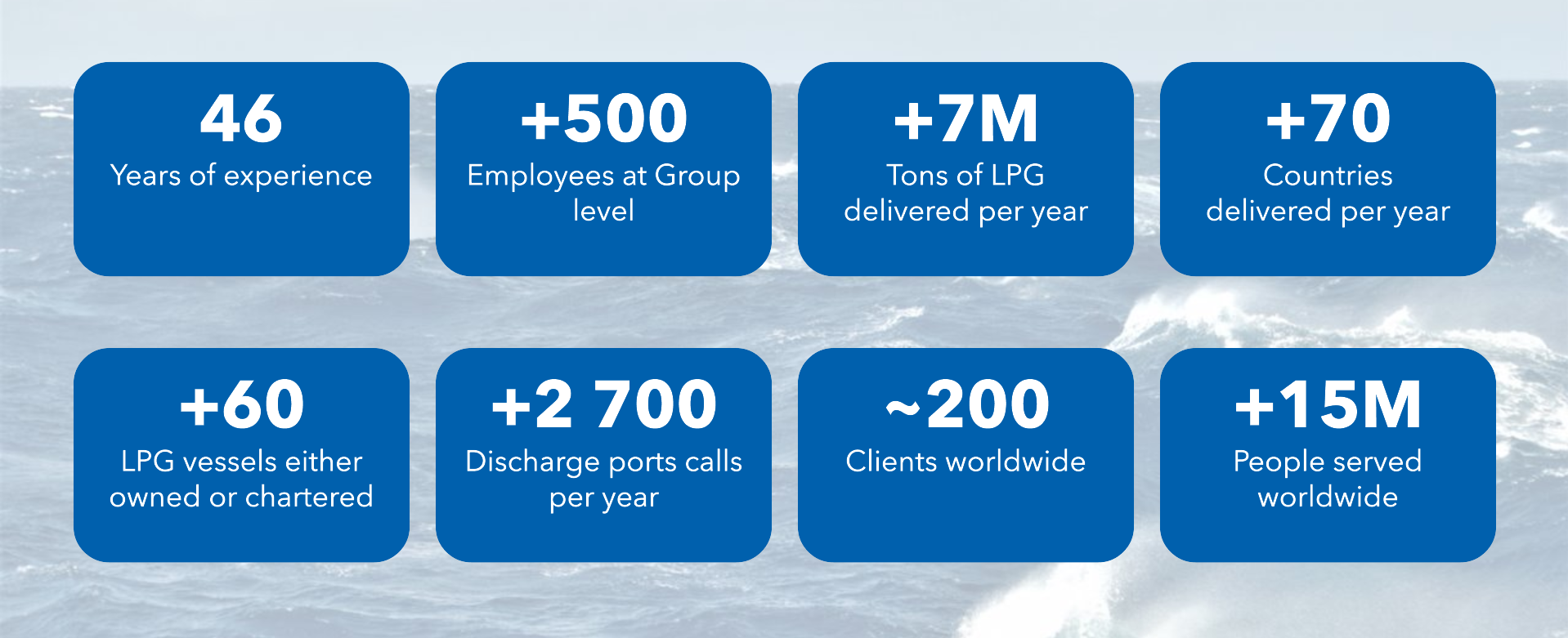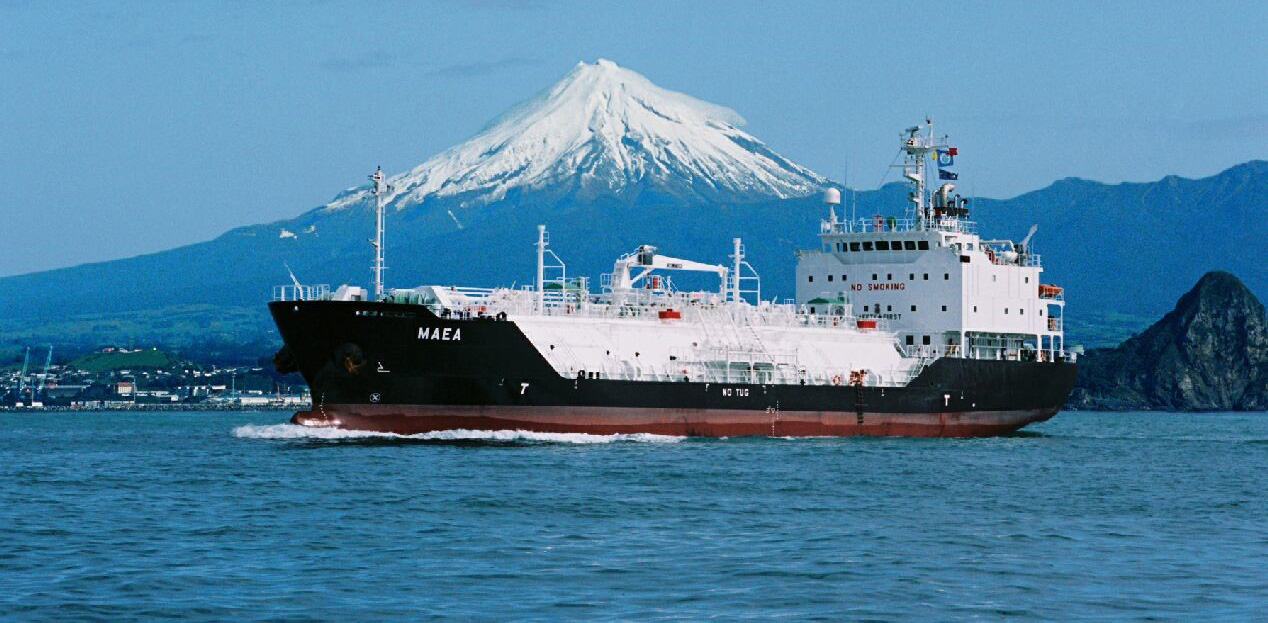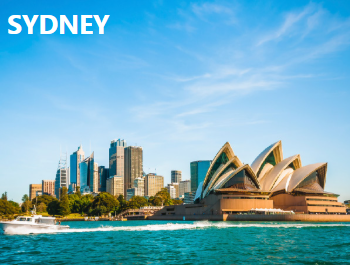

Geogas Group


The Geogas Group was formed in 1979 but has a lineage that stretches back over 60 years to the pioneering days of gas transportation. Singularly focused on seaborne trading and transportation of LPG, everything we do is guided by our long-term commitment to serving our customers, protecting the environment, strengthening communities we serve, supporting our teams and creating value for our stakeholders.

With a vision to be one of the leading providers of safe, secure supply and seaborne logistics to the Natural Gas Liquids industry, we deliver LPG in a safe and consistent manner to a diverse range of customers and markets around the world.
Geogas manages a fleet of some 50 LPG carriers, either directly owned or chartered, transporting over six million tonnes annually. This fleet covers the full spectrum of gas sizes and types from 4000m3 up to 90,000m3 in the pressurised, semi-refrigerated and fully-refrigerated sectors. (Please see our current Fleet List below)
Our seaborne logistics have two components, long haul and regional.
We cover long-haul LPG on large and mid-size gas carriers from the worldwide producing areas (US Gulf, US East Coast, Middle East, North and West Africa, Australia) to the main consuming areas of NW Europe, Mediterranean, Central and South America, Africa, Far East, Australia, New Zealand and the Pacific Ocean.
We have also developed, over many years, three regional break-bulk systems in the Caribbean, Africa (East and West) and Oceania, which deploy the full-size range of gas carriers bringing LPG to customers, often in remote locations with limited storage. To facilitate the supply through these break-bulk operations, our larger ships are designed for fully autonomous ship-to-ship transfer at sea.



The fundamentals of LPG are compelling. It is the cleanest form of fossil energy, using LPG helps the world move towards a lower carbon profile. LPG is a clean burning fuel, emitting fewer emissions of noxious pollutants and CO2 than most other fuels. Promoting the use of LPG for for cooking, heating and for fuel in taxis, cars and commercial vehicles contributes towards a healthier and more sustainable environment.
LPG makes a positive contribution to the well-being of the planet.
It is not a greenhouse gas
It is energy-rich, with a higher unit of calorific value than coal, natural gas, diesel, petrol and fuel
It is non-toxic

LPG is easily transported thus giving access to remote users and communities. Supply is resilient and LPG can be the first replacement fuel at times of natural disasters.

Can be used very effectively in off-grid hybrid installations for hot water and space heating providing energy when sunshine is absent. Thanks to its versatility, easy handling, high efficiency, low carbon and clean combustion, manufacturers of heat pumps and solar energy systems are increasingly turning to LPG hybrids.
LPG plays a significant role in the growing importance of decentralised power generation. Combining the same properties of low carbon footprint, low particles emissions and ease of handling, LPG is a viable alternative to the use of dirty fuel.
91%
In 2016, 91% of the world population was living in places where the WHO air quality guidelines levels were not met.
4.2 million
Ambient (outdoor air pollution) in both cities and rural areas was estimated to cause 4.2 million premature deaths worldwide in 2016.
91%
Some 91% of those premature deaths occurred in low and middle-income countries.
1600
The number of cities worldwide that are reporting air pollution levels.
96%
Autogas-fuelled cars now generates 90% less C02 than diesel and 68% less CO2 than petrol.
120x
Autogas emits 120 times less small particles emissions than diesel vehicles.
Is a low carbon fuel that emits almost no particles, thus improving indoor and outdoor air quality.
This helps to reduce premature deaths, which are estimated at 393,000 per year, just from inhaling cooking smoke from solid fuel fires.
Is an instant on/off cooking fuel that can free up time for education and income generation for women and girls who are disproportionately affected through domestic duties in low-income families. Thus, LPG can bring enormous benefits to the 4 billion people globally who do not have access to clean household energy and to the 700 million people and in Sub-Saharan Africa that depend on solid fuel for cooking.
80%
80% of all US farmers use LPG for a broad range of applications.
28.5%
According to the 2011 census of India, 28.5% of Indian households used LPG as cooking fuel.
30 million
Over 30 million European homes and businesses, mainly in rural areas, do not have access to the natural gas grid.
Through switching to LPG, a significant reduction to deforestation is achieved. When 100 households turn from consuming 200 tonnes of harvested wood each year to 22 tonnes of LPG, one hectare of forest is saved.


Environmental
Safety
Zero Port State Control (PSC) detentions the last three years
Pollution
Zero incidents in the last three years
Deforestation
27k hectare saved each year in Africa
Social
Employees
43 employees from 18 nations
Female Representation
35% of workforce
Community Support
25 projects in 9 countries
Governance
Board of Directors
5 directors, 100% attendance
Inclusion
2 female directors
International Associations
5 memberships
For a copy of our Sustainability Report 2024 please email Sustainability@Geogas.com


+41 22 809 1919
Geogas Trading S.A
Rue du Commerce 3
1204 Geneva
Switzerland

+33 15 364 1120
Geogas Maritime SAS and Geogas Enterprise SAS
209 Rue de l’Université
75007 Paris
France

+61 2 92 33 16 60
Oceangas Services Australia Pty Ltd
Level 4, 15 Help Street
Chatswood NSW 2067
Australia